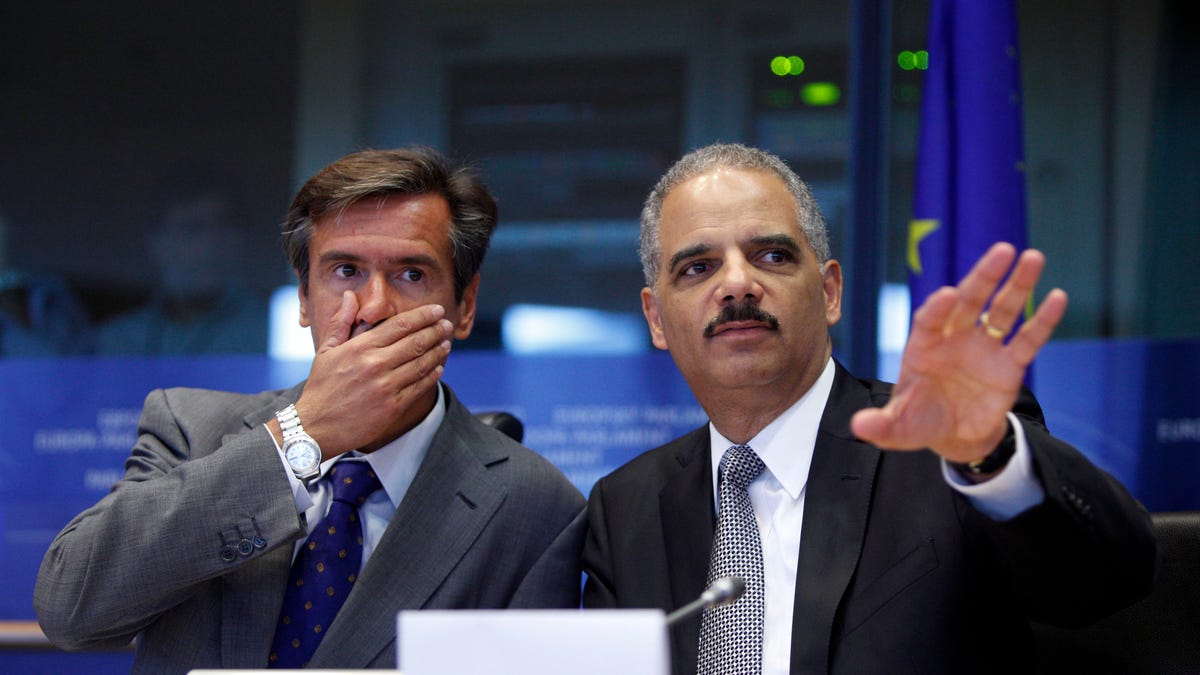
Spanish MEP Juan Fernandez Aguilar, left, looks on as United States Attorney General Eric Holder, right, speaks during a session at the European Parliament in Brussels on Tuesday, Sept. 20, 2011. (AP2011)
Even though the Obama administration failed to close Guantanamo Bay's detention facility by its self-imposed deadline of January 2010, it is now pushing to close it before next year’s election in a clear appeal to the president’s domestic base as well as countries critical of American detainee policy.
Speaking to reporters at the European Parliament in Brussels, Belgium on Tuesday, Attorney General Eric Holder made a striking pledge to put a new -- and what critics call -- an unrealistic time frame on shuttering the Guantanamo detention camps.
“We have an election that is coming up in 2012, in November of 2012. We will be pressing for the closure of the facility between now and then, and after that election, we will try to close it as well,” Holder insisted.
The attorney general’s statement in Brussels conflicts with reality at Guantanamo, where more than half of the remaining 171 detainees are from Yemen. The alleged al Qaeda and Taliban members cannot be sent home because of ongoing political instability in Yemen.
This week marked the most violent clashes in the capital Sana’a between the opposition and supporters of President Ali Abdullah Saleh that left more than 60 dead, according to Yemeni news reports. The Yemeni president has been in Saudi Arabia since June, where he is recovering from a mortar attack that left him severely burned.
U.S. officials say Yemen is now home to one of al Qaeda’s most lethal and active affiliates that was behind the last two major plots against the U.S. homeland using aircraft. The American born cleric, Anwar al-Awlaki, the first U.S. citizen on the CIA’s kill or capture list is believed to be hiding in Yemen as an operational planner for the al Qaeda affiliate known as Al Qaeda in the Arabian Peninsula.
U.S. officials recently confirmed that the CIA would launch a drone campaign in Yemen, similar to the campaign used in the tribal areas of Pakistan, to keep al-Awlaki and the Al Qaeda affiliate’s leadership under pressure to reduce its ability to plan attacks and train recruits.
A former Defense Department official in the Bush administration told Fox News that the Gitmo problem can't be solved until the Yemeni problem is solved.
Recent congressional testimony also shows the number of detainees who were released from Guantanamo and returned to the battlefield, like Kuwaiti national Abdallah al-Ajmi, who was behind a car bombing in Northern Iraq in the spring of 2008, is at an all-time high -- more than one in four.
“Quite right about rate, 27 percent,” Director of National Intelligence James Clapper told a rare joint session of the House and Senate intelligence committees earlier this month.
Senior White House officials have insisted that the Guantanamo camps are a recruiting tool for terrorists, but the administration's new head of the National Counterterrorism Center -- the hub for threat analysis -- seemed to undercut those claims during a recent confirmation hearing.
“Have you seen any evidence that we are safer, or that recruits have fallen off as a result of the president's announcement of his intent to close Guantanamo? “ Sen. Saxby Chambliss, R-Ga., asked Matt Olsen at the July session.
“I’ve not seen, from, again, my perspective, both on the (Guantanamo) task force and in a much more limited perspective in my current role at the national security agency, anything - in specific response to your question, to that effect, that there’s a change in recruiting based on the current government policy.”
While the White House counterterrorism adviser John Brennan recently pushed back against congressional efforts to dictate how the Obama administration prosecutes detainees, the fact remains that there is bipartisan support on Capitol Hill to block the transfer of detainees from Guantanamo.
National Correspondent Catherine Herridge's bestselling book "The Next Wave: On the Hunt for Al Qaeda's American Recruits" was published by Crown on June 21st. Drawing on her reporting for Fox News, it is the first book to investigate Al Qaeda 2.0 and the new generation of digital jihadists. It presents compelling evidence that the cleric, al-Awlaki, was an overlooked key player in 9/11 who double crossed the FBI.




